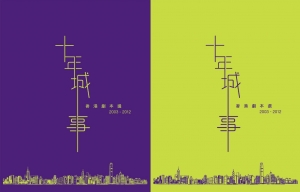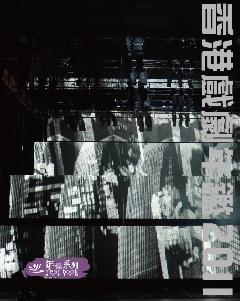 |
The first time Hoyingfung and Theatre Fanatico headed West was in 2003. That time he had an explorer working for the government, a peasant from the country, a sex worker from Shenzhen and one of those little emperors of a single–child family all embarking on the journey to western China, each pursuing her or his own aim. Hoyingfung's concern was what kind of irreversible impacts on the ecology of the region economic development would bring, when everybody was overwhelmed by what they imagined to be the profiteering opportunity of a life time.
Now in 2009 Hoyingfung is heading west again. The time is 2022. The ancient city of Gaochang is now under the judiciary of the Hong Kong Special Administrative Region, at a time when cities are run in the corporate model. The explorer has disappeared. His companions are charged with murder. Seven witnesses are called on to support the accusation and none for the defense. The only help they get is the reluctant Hong Kong defense lawyer, who was given the job as a routine duty and has absolutely no interest in the case or the defendants. What does he cares about these people who mean nothing to him? What does he cares about the western region? Do any of these events affect his cosy middle–class professional urban life lived out miles and miles away from Gaochang?
But don't be fooled by this dramatic set up and expect a melodramatic development of the story, because Hoyingfung is not going to give you that. He doesn't tell stories. He says the theatre is a field for his actions. Those of us who have seen him in action know what it means: it means taking his cast on a process of exploration and discovery – discovery of the subject matter and discovery of the self. He provides the framework and the direction; they fill in the contents. He sets up the bone structure, and on it they grow the flesh. In the process of creating the performance, his performers are often challenged and challenged and challenged again, to reflect on the subject matter, and then on their own perspectives of the subject matter, i.e. what does the particular issue they present in the show mean to them? What has informed their perspectives? In this way, the performers invest a lot of their own life in the performance; there are therefore always very personal elements in the performance that have come from the performers' take on the subject matter. Thus, even the most obvious topic in a Hoyingfung production often reveals itself in the most unexpected way because those personal perspectives of the members of the cast could sometimes take over part, or even the whole, of the narrative. Yet, there is also one guarantee of consistency: the cast members never completely leave their characters. They always stay close, but don't often assume their roles completely. The best of Hoyingfung's actors are able to keep a dialectical relationship with their characters: endowing the characters with the actors' own intellectual engagement with the subject matter, while being emotionally taken over by the characters, thus acting out the characters' sensational responses to their dramatic situations in an entirely convincing manner.
Such a creative process is certainly a rich experience for the actors, since the outward journey towards the characters and towards the subject matter always ends up turning upon itself and becoming an inward journey towards one's inner self. Yet, the challenge is how to share the fruits of such a rich experience with the audience. The answer is of course selecting the bits relevant to the audience and expressing them effectively on stage. This naturally involves creating the ideal audience in one's mind, designing theatrical devices and dramatic techniques to "do things to them". In the process one takes into consideration what shared premises they have with the audience, how to tell them things in a way they can understand and accept, and ultimately winning them over to one's side. In short, a lot of crafts and techniques are involved.
Interestingly Hoyingfung despises craftsmanship, though as a matter of fact he is a master of it, when he chooses to be. He despises stagecraft for the sake of itself, and quite rightly so. Therefore this is not to say that he is a minimalist in stagecraft. In fact I will call him a "maximalist"! He often bombards the theatre with abundant visual, verbal and audio images. What is difference about Hoyingfung's stagecraft is that it is employed for effectiveness, not efficiency, of communication. His spectacular visuals and glamorous sounds are deceptively entertaining. The audience is easily drawn in, but not necessarily comfortably so. More self–reflexive audience members often feel a sense of discomfort which feels almost like insecurity when they find themselves assaulted non–stop by visual and sound images which unfailingly invite multiple interpretations. Then frustration and fatigue follow. Yet the bombardment doesn't stop. So one has to make up one's mind: to walk out, or to participate in a more proactive way, both emotionally and intellectually. One can do it emotionally by switching off one's defense mechanism, submitting to the unfathomable passion of the performance and surf whole–heartedly along its "emotional landscape". Or one can do it intellectually by detaching oneself from the emotions and try to assign meanings to the symbolism, however fragmented and ambiguous the symbols may be. Those who choose to stay with the production always get a lot out of it, because they have abandoned the bad habits of a lazy audience. Sitting through a Hoyingfung production, you don't get entertained, you work hard, but ultimately you will find it a fruitful experience once you have wrestled with the visuals, or the sounds, or the blackouts.
本網站內一切內容之版權均屬國際演藝評論家協會(香港分會)及原作者所有,未經本會及/或原作者書面同意,不得轉載。








